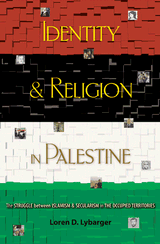
Identity and Religion in Palestine: The Struggle between Islamism and Secularism in the Occupied Territories by Loren Lybarger (Princeton: Princeton University Press, 2007)
This remarkable book examines how the Islamist movement and its competition with secular-nationalist factions have transformed the identities of ordinary Palestinians since the first Palestinian uprising, or intifada, of the late 1980s. Drawing upon his years living in the region and more than eighty in-depth interviews, Loren Lybarger offers a riveting account of how activists within a society divided by religion, politics, class, age, and region have forged new identities in response to shifting conditions of occupation, peace negotiations, and the fragmentation of Palestinian life.
Lybarger personally witnessed the tragic days of the first intifada, the subsequent Oslo Peace Process and its failures, and the new escalation of violence with the second intifada in 2000. He rejects the simplistic notion that Palestinians inevitably fall into one of two camps: pragmatists who are willing to accept territorial compromise, and extremists who reject compromise in favor of armed struggle. Listening carefully to Palestinians themselves, he reveals that the conflicts evident among the Islamists and secular nationalists are mirrored by the internal struggles and divided loyalties of individual Palestinians.
Identity and Religion in Palestine is the first book of its kind in English to capture so faithfully the rich diversity of voices from this troubled part of the world. Lybarger provides vital insights into the complex social dynamics through which Islamism has reshaped what it means to be Palestinian.
“Lybarger explores the processes by which individuals change and adopt identities as they live through sharply disturbing events. He asks how people have responded to the actions of Fatah, Hamas, and other organizations seeking to position themselves against Israel, and then proceeds by tracing the life courses of a number of individuals through these events and through their choices among possible affiliations. The strength of the book comes from the author’s long acquaintance with these individuals and emerges in the detail about their lives and their expressions of their own religious and political choices and consequences. I found these narratives compelling.”–John R. Bowen, author of Why the French Don’t Like Headscarves
Loren D. Lybarger is Assistant Professor of Classics and World Religions at Ohio University, Athens.